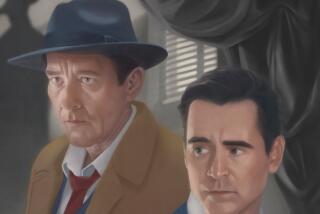Was it Napoleon’s second Waterloo?
- Share via
With “Monsieur N.,” director Antoine de Caunes and writer Rene Manzor have fashioned an elegant, sophisticated mystery from a combination of contradictory historical records and tantalizing speculation that surrounded the fate of Napoleon Bonaparte during his exile on the island of St. Helena beginning in October 1815 after his defeat at Waterloo.
The film raises more questions than it answers, but in a sly, subtle way it implies its own take on whether or not Napoleon really died on the island in 1821. It is not as compelling as Ben Weider and David Hapgood’s 1982 nonfiction page-turner, “The Murder of Napoleon,” which Jack Nicholson reportedly had under option for a long time and which meticulously made a case for the deposed emperor of France having been poisoned by arsenic. Indeed, it seems fair to say that those who will most enjoy wending their way through the film’s thicket of intrigue are those already captivated by Napoleon’s legend and fate. Admirable and worthwhile, “Monsieur N.” is also at times wearying.
As have other agencies, the FBI has ascertained that strands of Napoleon’s hair do contain abnormally high levels of arsenic -- if it was actually Napoleon’s corpse they were taken from. (Arsenic was easily available because St. Helena was overrun by rats.) There seems to be no end of suspects or possible motivations, if in fact Napoleon was murdered. Napoleon’s principal attendants are the impecunious Gen. Montholon (Stephane Freiss), who hopes a bequest from Napoleon will pay his creditors and so as insurance that this will happen looks the other way as his conniving wife, Albine (Elsa Zylberstein), becomes Napoleon’s mistress. There’s also the seemingly deeply loyal Marechal Bertrand (Roschdy Zem) and Napoleon’s ill-fated butler Cipriani (Bruno Putzulu), the former emperor’s closest confidant -- and possibly his brother as well.
At the center of the drama is Napoleon (Philippe Torreton), a shrewd, reflective man; Sir Hudson Lowe (Richard E. Grant), an insecure martinet, the island’s newly appointed governor and therefore Napoleon’s jailer, who is ultimately no match for his prisoner; and Betsy Balcombe (Siobhan Hewlett), a local belle and daughter of a wealthy English merchant. The lovely Balcombe sees Napoleon as a human being rather than as a conquering hero on a horse, as depicted in paintings and sculpture. His innate brilliance and perception distract her from his paunchy, balding middle-aged appearance. Sir Hudson did maintain a liaison office between Napoleon and himself, but his liaison officer in the film, Basil Heathcote (Jay Rodan), is a fictional character who sustains the story’s narrative thread and who is smitten by Betsy and liked by Bonaparte. “Monsier N.” is a film of polished ensemble performances, burnished period interiors and fine landscapes, but it’s a little bloodless.
*
‘Monsieur N.’
MPAA rating: Unrated
Times guidelines: Adult themes, some sexuality
Philippe Torreton...Napoleon Bonaparte
Richard E. Grant...Sir Hudson Lowe
Jay Rodan...Basil Heathcote
Elsa Zylberstein...Albine de Montholon
Siobhan Hewlett...Betsy Balcombe
An Empire Pictures release of a Loma Nash presentation. Director Antoine de Caunes. Producers Marie-Castille Mention-Schaar, Pierre Kubel. Screenplay by Rene Manzor; based on an original idea by Pierre Kubel. Cinematographer Pierre Aim. Editor Joele van Effenterre. Music Stephan Eicher. Costumes Carine Sarfati. Production designer Patrick Durand. In French, with English subtitles. Running time: 2 hours, 7 minutes.
Exclusively at the Music Hall, 9036 Wilshire Blvd., Beverly Hills, (310) 274-6869; One Colorado, 42 Miller Alley, Pasadena, (626) 744-1224; University 6, 4245 Campus Drive, Irvine, (949) 854-8818.
More to Read
Only good movies
Get the Indie Focus newsletter, Mark Olsen's weekly guide to the world of cinema.
You may occasionally receive promotional content from the Los Angeles Times.










